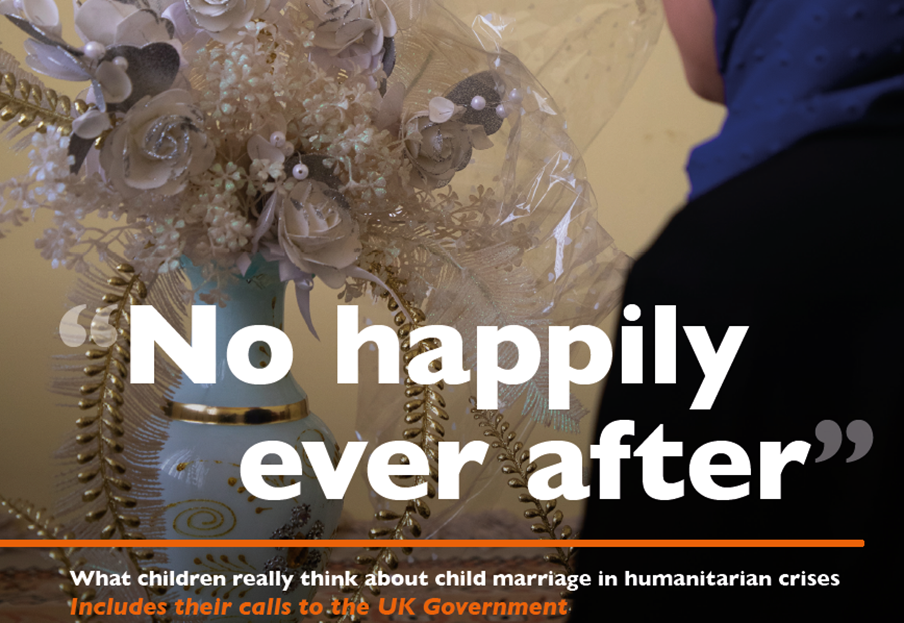Raising children and young people’s voices to facilitate advocacy!

Author: Dr. Carine Le Borgne, Senior Policy Advisor & It Takes a World Lead, World Vision UK
Research has shown that 9 out of 10 countries with the highest child marriage rates are fragile or extremely fragile states[1]. In countries like Afghanistan and Bangladesh (Cox’s Bazar), child marriage is illegal – but all too often these laws are not implemented, particularly in places where children have been displaced.
I conducted a research project for World Vision UK’s It Takes a World campaign, ‘No Happily Ever After‘, published in February 2020, that raises the voices and views of the children and young people who are affected by the issue of child marriage in countries facing a humanitarian crisis.
“Today I am able to share my story with you because of World Vision’s Community Change Sessions. If the facilitator didn’t help me, I am not sure what would happen to me. I am doing my best to be once again a top student in my class. I am more determined to finish high school and study medicine.” (Rahila, girl, 14, Afghanistan, formerly at risk of child marriage)
The report also draws on the voices of children and young people who have not experienced child marriage, but who want to stand with their peers.
More than 80 children from Afghanistan; Bangladesh; Rohingya refugee camp, Cox’s Bazar (Bangladesh); Niger and UK – girls and boys -13 to 18 years, were part of this research. The aim of the research was to understand how the children felt about the stories of girls who were affected by the issue of child marriage and what they hoped for the girls.
‘We need to change people’s personal views, people are becoming blind to child marriage and see it as a norm’ (Toby, boy, 16, UK)
Following the focus group discussion, thematic analysis was used for identifying the children’s calls to action. The aim was to write a report using the participants’ voices as directly as possible; and to create a new way to facilitate their advocacy.
The result is this report, encapsulating three stories of child marriage, the comments of the focus group participants about the stories, their messages to the UK Government and their three calls to action for the UK Government as an aid donor country.
-
Call 1: We call on the UK Government, as an aid donor, to use their political influence and diplomacy to stop child marriage in countries suffering humanitarian crises.
Actions: raise awareness of the negative consequences of child marriage (e.g. Involve religious leaders in checking age before marrying them), change societal attitudes and cultural norms (e.g. Stop the dowry system and the bride price), empower girls and women, ensure access to education (e.g. Ensure that girls finish the secondary schools) and technical training for girls, implement better legislation on child marriage (e.g. Marriage should be banned before the age of 18)
-
Call 2: We call on the UK Government, as an aid donor, to provide more funding for projects that reduce children’s vulnerability to child marriage in countries suffering humanitarian crises.
Actions: allocate more funding for child protection, health, mental health and psychological support (e.g. Create child protection committee to report cases of child marriage), allocate more funding for humanitarian aid (e.g. Provide income generation activity to parents, provide more projects in remote areas)
-
Call 3: We call on the UK Government, as an aid donor, to provide more platforms for British and overseas children to raise awareness and discuss solutions, to prevent and stop child marriage.
Actions: create more children’s fora in communities so children can learn and advocate against and help prevent and stop child marriage, involve British children in raising awareness within the UK public through the media and other platforms
I was fortunate to go to Niger at the end of January and meet some of the children and young people who participated in the research. For me, to give children the research feedback is always the best part. My visit in Niger was special as 76% of girls are married before they reach 18 years.
In the UK, the children and young people involved in the research had the opportunity to discuss the research directly with three Members of Parliament and raise the voice of children from overseas. As an outcome, an MP asked a written question to the Secretary of State for International Development on child marriage in humanitarian situations.
The CRC Committee on the General Comments 12 underlines that the right to be heard does not cease in situations of crisis or in their aftermath, so asks how we can engage children and young people to ensure their perspectives are heard and needs are met. This statement is critical in this period of COVID-19. When the Coronavirus hits countries facing a humanitarian crisis, it will cause an increase of social instability and poverty among refugees. We know girls who are already vulnerable to child marriage will become even more susceptible to being forced into early marriage to alleviate the family burden.
As countries build understanding and evidence to develop their policies and long-term strategies to deal with the aftermath of this crisis, we need to recognise the rights of children to participate in research and to be involved in shaping policy through appropriate mechanisms.




Comments are closed
Comments to this thread have been closed by the post author or by an administrator.